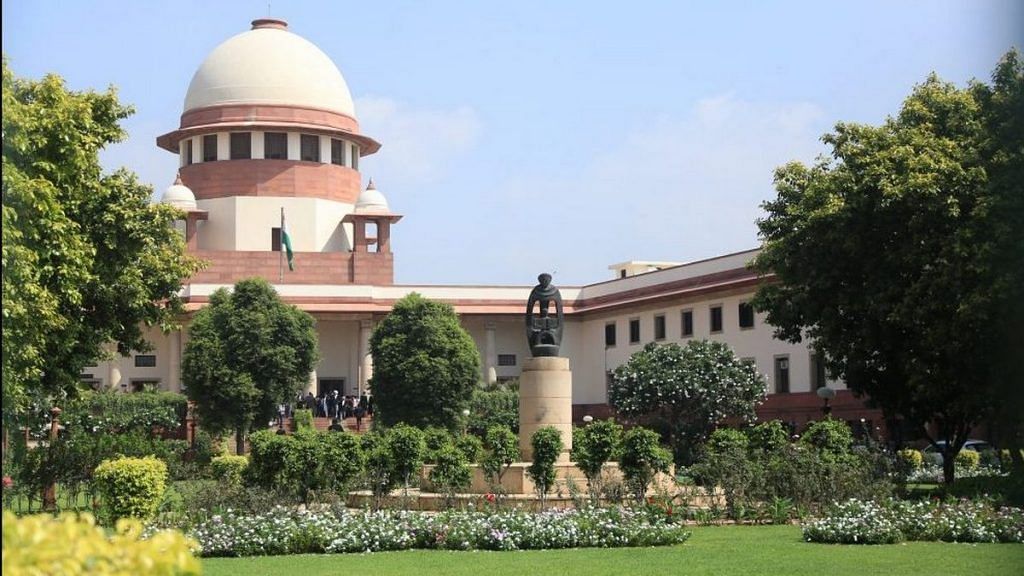Supreme Court got 2 new judges Friday — Karnataka High Court Chief Justice Dinesh Maheshwari and Delhi High Court judge Sanjiv Khanna.
New Delhi: Karnataka High Court Chief Justice Dinesh Maheshwari and Delhi High Court judge Sanjiv Khanna were sworn in as the new judges of the Supreme Court Friday.
Their names were cleared by the central government Wednesday, with the letter of appointment coming merely six days after the Supreme Court collegium recommended them.
Their appointments, however, have been mired in controversy because in recommending Justice Khanna’s name, the five-judge SC collegium had superseded three judges senior to him from his parent court, the Delhi High Court — Rajasthan High Court Chief Justice Pradeep Nandrajog, Jammu and Kashmir High Court Chief Justice Gita Mittal and Delhi High Court judge S. Ravindra Bhat.
In the case of Justice Maheshwari, the collegium had superseded him in October last year when it recommended the elevation of the then Chief Justice of the Tripura High Court, Justice Ajay Rastogi — originally from the Rajasthan High Court — to the Supreme Court.
As if that wasn’t enough, the apex court, while elevating Maheshwari and Khanna, had rescinded its earlier decision recommending Delhi High Court Chief Justice Rajendra Menon and Nandrajog for the Supreme Court.
With the new appointments, the apex court will now have 28 judges as against a sanctioned strength of 31. ThePrint profiles the two new judges.
Justice Dinesh Maheshwari
The son of prominent Jodhpur advocate Ramesh Chandra Maheshwari, Justice Maheshwari completed his law degree in 1980 and enrolled as an advocate a year later.
After practicing for 23 years, he was elevated as a judge of the Rajasthan High Court in 2004. In February 2018, Justice Maheshwari was appointed the chief justice of the Karnataka high court.
During his tenure there, Justice Maheshwari courted controversy when he re-initiated an inquiry against P. Krishna Bhat, a district judge, at the Centre’s behest.
Bhat’s promotion was stalled in light of allegations of “atrocities and abuse of power” made by a female judicial officer. Though Bhat was cleared of all charges twice, Justice Maheshwari initiated a third inquiry — purportedly on instructions issued in a letter written directly by the Law Ministry.
As the Karnataka high court chief justice, in November 2018 Maheshwari ruled that PILs could not be used as a tool to wreak vengeance. The bench led by him made this observation while dismissing a plea of a woman who had filed criminal charges against her husband.
In September 2018, the bench led by Justice Maheshwari had ruled that fashion shows were entertainment and hence liable to attract state tax.
Last July, Justice Maheshwari delivered another important judgment in which he clarified that a mere description of any minister in the council of ministers as a deputy chief minister “does not confer the person concerned with any powers of the chief minister and does not result in any unconstitutionality”.
While at the Meghalaya High Court, as chief justice, Maheshwari had ruled that all Tibetans born in India after 26 January 1950 and before 1 July 1987 — as per the Citizenship Act, 1955 — were to be considered as Indians.
Also read: Supreme Court spells relief for Maharashtra dance bars, frees them of CCTV rule
Justice Sanjiv Khanna
Justice Khanna is the nephew of Justice H.R. Khanna, who has gone down in the annals of history for his minority dissent in the 1977 ADM Jabalpur case — more popularly known as the habeas corpus case.
Justice H.R Khanna paid a huge price for this dissent as it cost him the post of chief justice. He was superseded — at the behest of then Prime Minister Indira Gandhi — by Justice M.H. Beg.
Justice Khanna completed his education in 1983 and immediately enrolled as an advocate with the Bar Council of Delhi. In 2005, Justice Khanna was appointed as a judge of the Delhi High Court where he rose through the ranks — he is now the third senior-most judge at the high court.
His peers from his lawyer days remember him fondly. “Justice Khanna was always focused on his brief,” said advocate K.C. Mittal, the president of the Delhi High Court Bar Association said. “I hardly saw him indulging in corridor gossip or spending time in the canteen with other lawyers.”
As a judge, Mittal says Justice Khanna is humble and compassionate.
“I remember a case where we had a difference of opinion on the interpretation of a Supreme Court judgment,” Mittal said. “Justice Khanna gave me time and heard me at length; unfortunately, I was unable to convince him otherwise.”
Justice Khanna is known to be well-versed with all aspects of law, though Mittal said he is considered to be an expert on taxation law.
During his tenure at the Delhi High Court, Justice Khanna had delivered over 3,000 judgments. In March 2018, he set aside the disqualification of 20 Aam Aadmi Party (AAP) MLAs for holding an office of profit as parliamentary secretaries in state sending the case back to the Election Commission for fresh consideration.
In September 2018, a bench comprising Justice Khanna ruled that Amazon Kindle was not a dictionary and could attract customs duty. He has also authored several landmark judgements including the 2015 judgment where he ruled in favour of the revenue department and held that market intangibles were international transactions and came under the ambit of transfer pricing.
At the same time, however, he also laid down accepted norms for compensation due to the Indian subsidiaries of global brands for incurring advertisement and marketing expenses in order to promote their products here.
Also read: Row over collegium picks for Supreme Court escalates but govt appoints them
